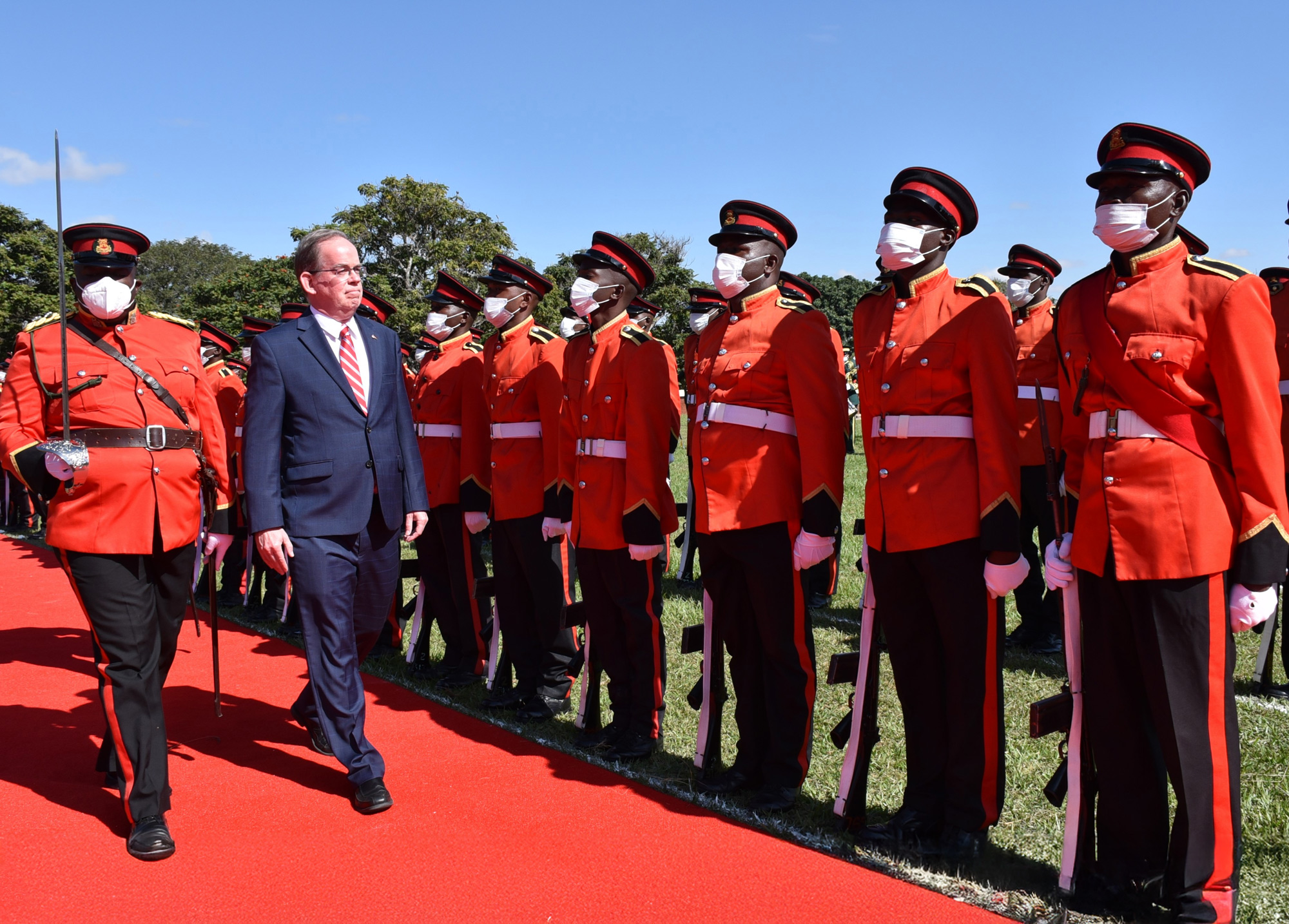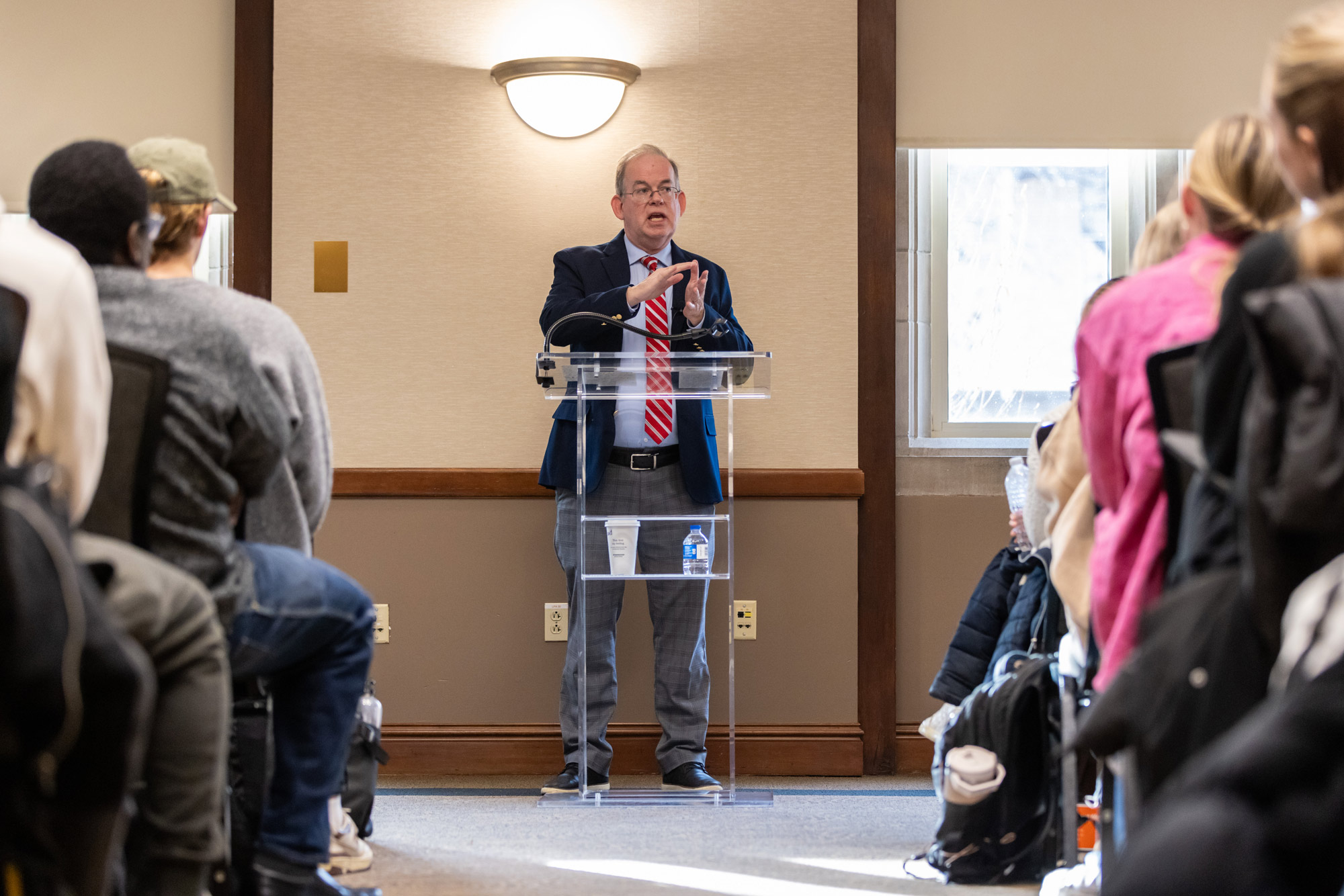
Published on Show Me Mizzou April 24, 2025
Story by Randall Roberts, BA ’99
In February, Ambassador David Young, BJ ’84, visited Mizzou to meet with students and faculty at the Kinder Institute on Constitutional Democracy. With a distinguished career spanning more than three decades, he has served in diplomatic posts across Africa and Southeast Asia.
Young’s expertise in human rights, governance and international relations has shaped key diplomatic efforts, from negotiating political transitions to securing the release of prisoners of conscience. In this conversation, which has been edited for length and clarity, he discusses his journey from journalism to diplomacy, the challenges and rewards of his global service, and the powerful moments that defined his career.
MIZZOU:You started in journalism at Mizzou and ended up in international relations. How did that happen? Do you still use any of those journalism skills in diplomacy?
David Young: Yes, I would say that my training at Missouri was really influential throughout my whole professional life. The skills I developed in journalism, especially communication, were crucial. In the Foreign Service, I was essentially a reporting officer on political and economic issues, so my journalism background — writing, reporting, editing — was decisive. Also, public speaking and working with the press were impactful, especially when doing TV, radio and print interviews. More recently, I got involved with social media outreach at embassies.
My path was a bit unconventional. After Missouri, I went on a Rotary Scholarship to Trinity College in Ireland, where I studied comparative religion and peace studies. I was interested in ministry, so I continued at Boston University’s School of Theology, where I studied social ethics. After that, I earned a master’s in international relations, and one of my professors suggested that I take the Foreign Service exam. I thought I’d stay for three to five years — and then 35 years later, I retired from the Foreign Service.
You’ve spent time in global hotspots during some historically challenging periods. What moments stand out to you, both difficult and rewarding?
One of my most impactful jobs was in Hanoi, Vietnam, from 1998 to 2001. I was part of the second generation of diplomats at the newly established embassy. My role was as a human rights and religious freedom officer, and I analyzed the Communist Party Politburo. Since Vietnam had a communist government, I was followed and monitored by the secret police. Still, we managed to secure the release of about 40 to 50 political and religious dissidents. That was meaningful but challenging. The country is beautiful, the people are friendly, but the government was tough to deal with.
In the last decade of my career, I worked in leadership roles in sub-Saharan Africa: Zambia, South Africa, Nigeria, Malawi and Sudan. As ambassador, I was like the CEO of an embassy, leading strategy and outreach. As deputy chief of mission, I focused on internal management. I loved both roles. My ministerial background influenced my leadership style. I saw embassies as teams where everyone’s contributions mattered. The high point of my career was leading these embassies.
Did you raise a family while working overseas?
Yes, my wife and I have been married for 30 years, and we have two kids: Paul, 28, and Sarah, 27. They grew up moving between the U.S. and overseas. They attended preschool in Vietnam, middle school in Guatemala and high school in Zambia. It gave them a global perspective, which has been wonderful.
Have there been any particularly memorable experiences where you felt
you were observing history unfold firsthand?
One of the most powerful experiences was in Zambia. I helped negotiate with the former president to allow the opposition leader to run for office; he had been arrested multiple times. When the opposition won in a landslide, we negotiated a peaceful transition of power.
Another moment was in Nigeria. There was a massacre in Plateau State, and a Muslim imam, Abdullahi Abubakar, sheltered 260 Christians in his mosque and saved their lives. He risked everything, even offering his own life to the attackers. I met him several times. He’s one of the most heroic people I’ve ever encountered.
Throughout your career, what have been the most profound lessons about diplomacy and the complexities of human relationships?
Leadership isn’t just about credentials — it’s about human qualities. People who are positive, caring and visionary make the best leaders. My diverse background — journalism, theology, international relations — allowed me to bring different strengths to leadership. Diplomatic skills aren’t just for diplomats; they’re for everyone. We all need to manage conflict productively.
One thing that pains me is seeing how divided the U.S. has become. Abroad, I led diverse teams — military officers, human rights experts, medical professionals, economists — all working together. It embodied our national motto, E Pluribus Unum. I hope we can reclaim that spirit here at home.

To read more articles like this, become a Mizzou Alumni Association member and receive MIZZOU magazine in your mailbox. Click here to join.



